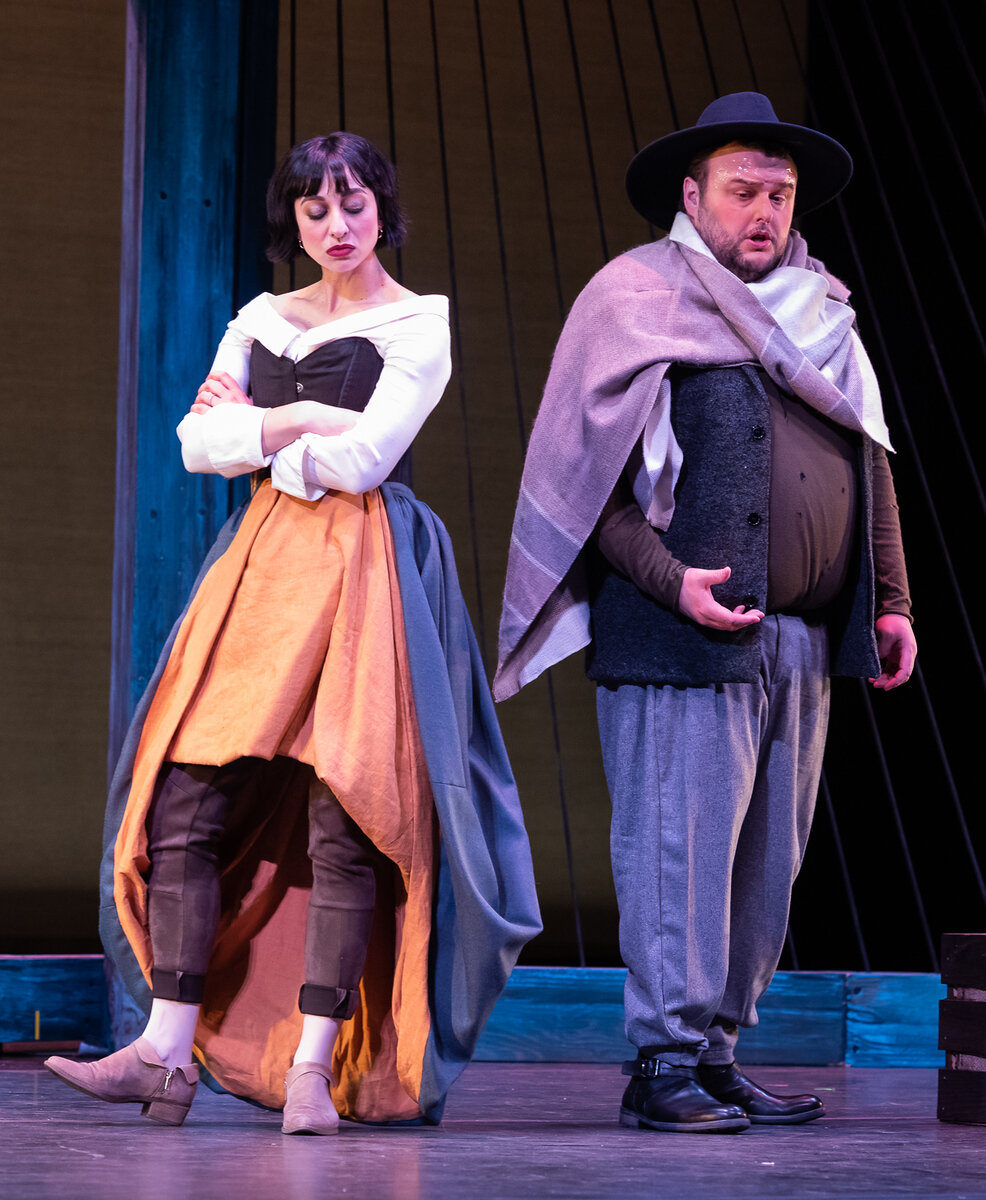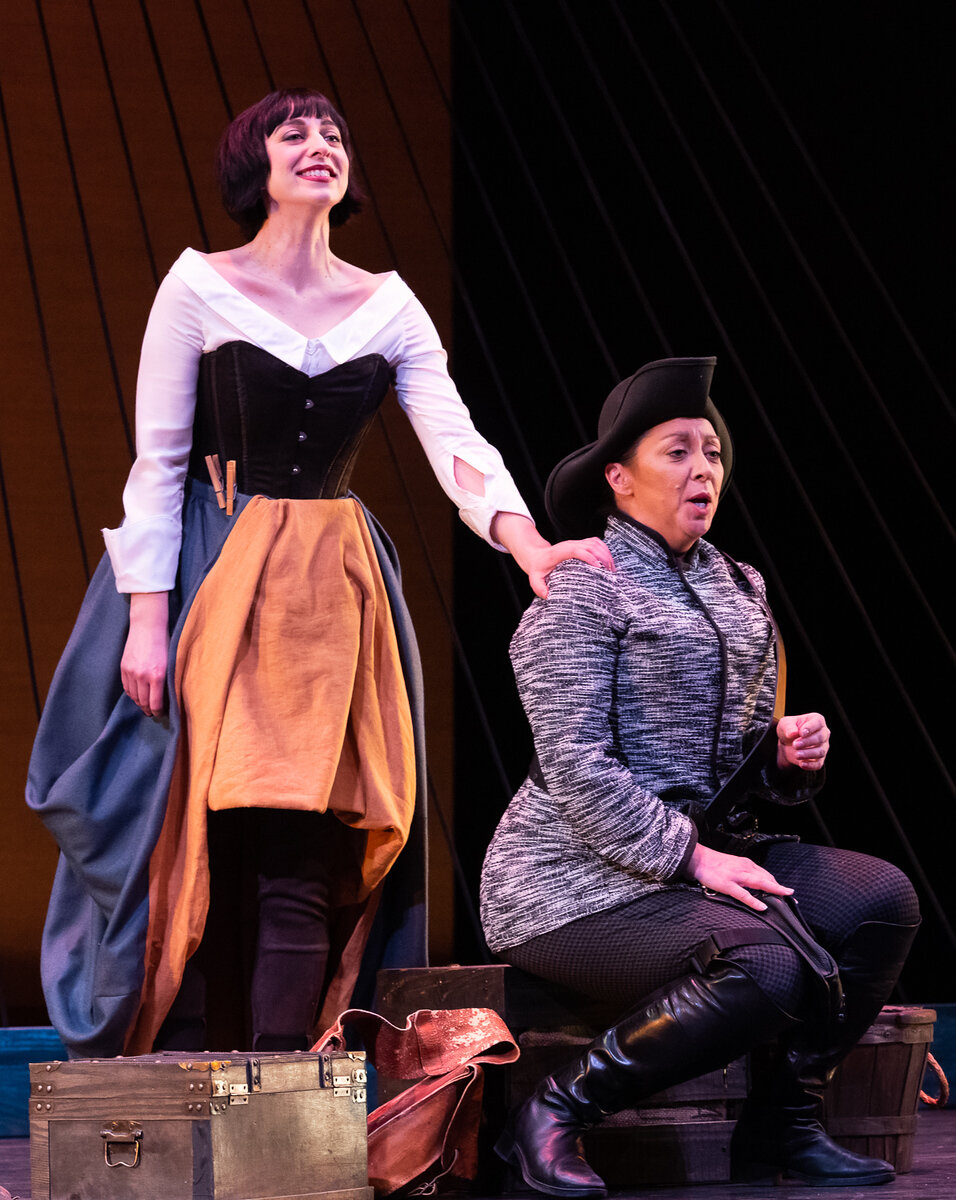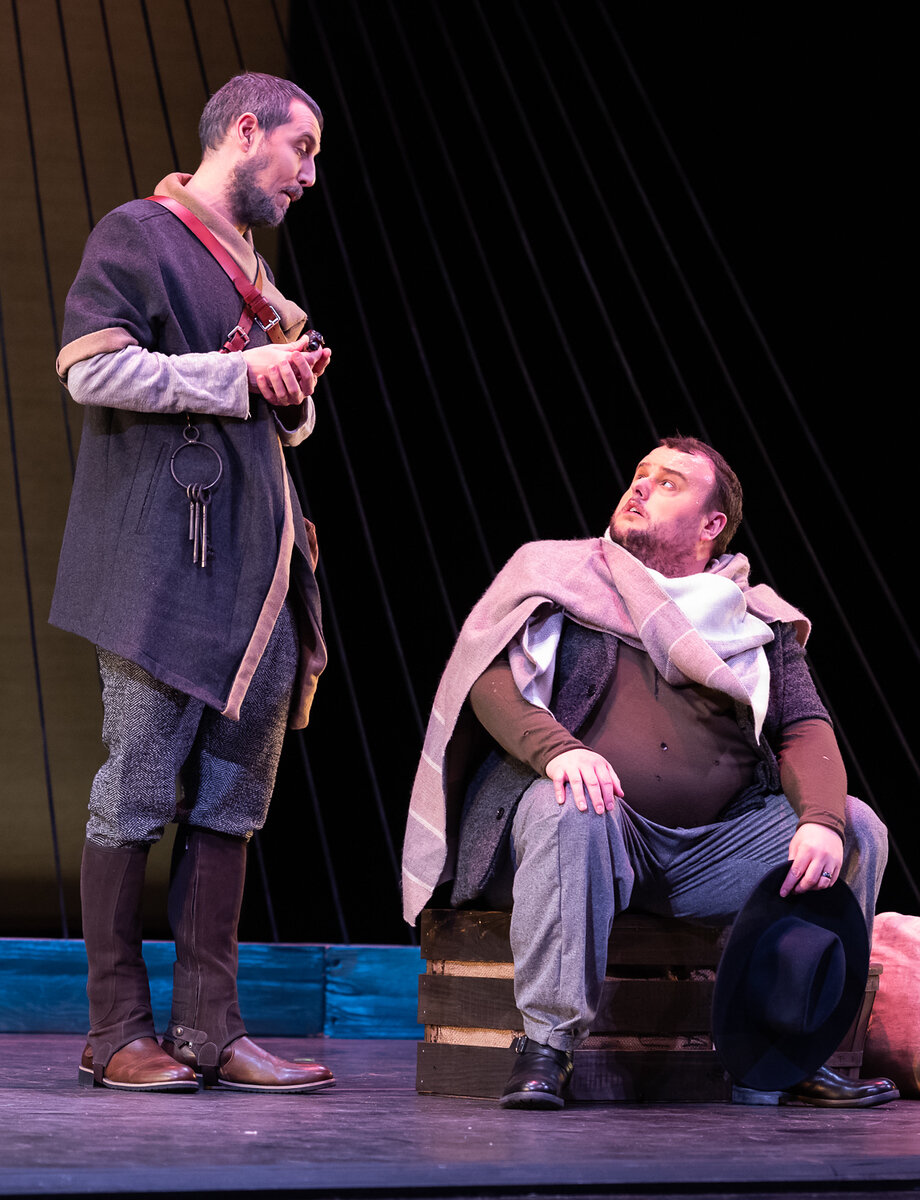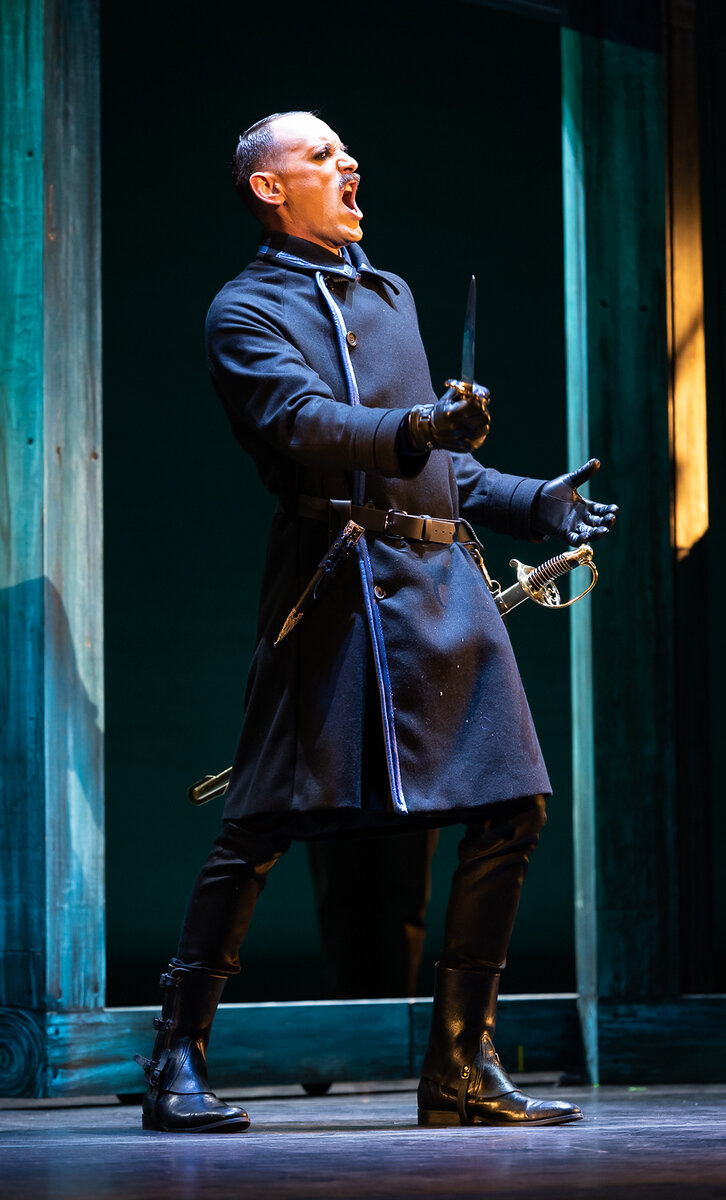The star of Wednesday night’s performance of Leonore (1805) for most of the audience was Opera Lafayette celebrating its 25th anniversary and its conclusion of the Leonore Project, but for me, the real star was Beethoven reminding us why after 250 years we still are celebrating his birthday. Yes, the story of Leonore was told in an interesting way and the singing was great, but it was Beethoven’s music that I got lost in. That itself is a tribute to Opera Lafayette. And the performance got off to an auspicious beginning; workman had to repair the podium in the pit that creaked every time Maestro Ryan Brown, OL’s Founder and Artistic Director moved, and as he noted, he moves a lot while conducting. Small matter, I found myself being moved once the conducting started.
Married love and courage has triumphed over injustice as Floristan (Jean-Michel Richer) and Leonore (Nathalie Paulin) are reunited. Photo by Louis Forget; courtesy of Opera Lafayette.
If you know the story of Leonore, you probably know it from Beethoven’s Fidelio. A woman Leonore in the post French Revolution period disguises herself as a man, Fidelio, to gain access as a prison worker to the facility where her husband, Floristan, has been unjustly imprisoned for his political activism. Time grows short as the Governor who imprisoned Floristan plans his imminent death, while the situation grows complicated as the jailer’s daughter, Marzelline, has fallen in love with Fidelio, believing her to be a man. Why did such a story appeal to Beethoven?
The love triangle: left, Marzelline (Pascal Beaudin) spurns her suitor, Jaquino (Keven Geddes), while right, she adores her new man (?), Fidelio (Nathalie Paulin). Photos by Louis Forget; courtesy of Opera Lafayette.
These were turbulent years; the French Revolution and the Reign of Terror were still in the rearview mirror and Napoleon’s armies were marching across Europe while Beethoven worked on the score. A number of successful “rescue operas” were created in this period where spouses attempt to free their mates who have been unjustly incarcerated. This theme resonated with Beethoven when he saw the libretto written by Jean-Nicholas Bouilly for composer Pierre Gaveaux’s highly successful French opera, Léonore, ou l’amour conjugal (1798). The Maestro decided to take a try at it himself, not realizing the journey he was beginning. Examining the relationship between Beethoven’s and Gaveaux’s Leonores was an important element of the OL’s Leonore Project; refer also to the blog report on my discussion with Ryan Brown.
left: Rocco (Stephen Hegedus) advises Jaquino (Kevin Geddes); right: Matthew Scolin as the evil prison governor,Pizarro. Photos by Louis Forget; courtesy of Opera Lafayette.
In about a year, Beethoven and his librettist, Joseph Sonnleithner, turned out Leonore, which premiered in Vienna in 1805. It was a flop. Napoleon’s army had just occupied Vienna and wealthy patrons had departed the city for their country retreats. Many operas at the time were playing to half empty opera houses, and Leonore proved not to be an exception. Furthermore, many opera-going patrons were unfamiliar with the German language and many felt the opera too long. Beethoven was convinced to pair it down, make some changes, and the new version was presented in 1806, a modest success. He revised it once more for an 1814 premiere that we now acclaim as his only opera, Fidelio. So, ten years past, and the versions changed as the pressures on Beethoven changed and Beethoven as a composer changed. There were some additions, deletions with the major changes being the number of acts trimmed from three to two, new overtures for each version, and a modified ending. Interestingly, Beethoven wrote a fourth overture that was to be presented in an 1808 revival that never came off. Fidelio is the version that has entrenched itself in today’s opera repertoire. All three versions of the opera are known as Beethoven, Opus 72.
In the Leonore Project, OL did a great deal of research to understand Leonore in the context of its historical and musical landscape, a defining characteristic of Opera Lafayette in its mission to present modern premieres of works no longer presented today. OL went so far as to present Gaveaux’s opera about Leonore back in 2017 and have turned that performance into a DVD available for purchase through Naxos. OL also plays each of its performances using period instruments to present the music as authentically as possible.
Authentic, fine; where does the imagined part come in? Often working from scores of operas from hundreds of years ago means working with a few surviving copies of handwritten scores; some interpreting is required. In Leonore (1805)’s case, there was a missing section to Floristan’s Act III aria remembering his time with his wife. Mr. Brown convinced his friend and colleague, musicologist and conductor Will Crutchfield to attempt a reconstruction of the missing piece, which he did using all available relevant materials. I thought it worked. It was beautiful and added emotional depth and continuity to the aria.
Rocco (Stephen Hegedus) and Leonore (Nathalie Paulin) find the secret prisoner, Floristan (Jean-Michel Richer) on the floor of the dungeon. Photo by Louis Forget; courtesy of Opera Lafayette.
The Stage Director, Oriol Tomas, and several members of the cast from 2017’s performance of Gaveaux’s opera were in the same roles, including tenor Jean-Michel Richer as Floristan, soprano Pascal Beaudin as Marzelline, tenor Kevin Geddes as Jacquino, Marzelline’s jilted admirer, and bass Alexandre Sylvestre as Don Fernando, the king’s minister to the province - one big difference was that they were singing in German, not French this time. The stage set was also from the previous opera, a minimalist construct of beams and ropes suggesting a separation of space; additionally, there were period costumes, and a few props. In fact, for Leonore/Fidelio, little is needed for staging, a jailer’s quarters, a prison courtyard, and a dungeon, all grayish and grim.
The singers all performed well in their roles. In addition to the singers named above, soprano Nathalie Paulin was Leonore; bass-baritone Stephen Hegedus sang the role of the jailer Rocco; and, bass-baritone Matthew Scollin played Pizzaro, the evil governor of the prison. Ms. Paulin played Leonore with restraint, a demeanor one might expect of a cautious impostor; her lovely soprano voice, also restrained, served the role well. Pascal Beaudin displayed an enjoyable flirtatious charm as Marzelline and sang with a light lilting soprano voice as well. Keven Geddes as Jacquino displayed a lovely tenor voice and lovable charm. I enjoyed Mr. Hegedus’ voice and singing, though his acting could have used a bit more gravitas. Mr. Scollin is an excellent bass-baritone and made an excellent villain, but I had a problem with his appearance as Hitler-like, breaking with the time period of the 18th century. Tenor Jean-Michel Richer was a good choice for Floristan in appearance and voice. The sound of the chorus was beautiful, but in their main aria in the courtyard, my preference would have been to have more voices in the men’s chorus; it’s an impressive aria whose impact would have been greater with more volume.
The king’s minister Don Fernando has arrived, freeing the political prisoners and saving Floristan (Jean-Michel Richer) and Leonore (Nathalie Paulin). Photo by Louis Forget; courtesy of Opera Lafayette.
In my view, the staging did not overcome two obstacles. First, for me, Beethoven’s ending is too protracted; I also thought so of Fidelio’s; I was ready for it to be over before it was over. Secondly, in the crucial scene where Leonore reveals her true identity to all in the dungeon, there were titters of laughter as each player registered their surprise. I actually think both of these are the result of the difference between today’s and early nineteenth century audiences. The wounds of the excesses of the French Revolution and Napoleon’s reign were fresh in audiences of the early nineteenth century, and Beethoven was providing the catharsis they needed. Not so deeply felt today. It is interesting that the ending of Leonore exalts more the triumph of courage and love, while the ten-year later Fidelio ending emphasizes more freedom and the triumph of God’s will. The processing of the wounds was still ongoing in the early nineteenth century.
I have saved the best for last, Mr. Ryan and his 44-piece orchestra gave me a musical experience I shall long remember. My seat was in the front row; I felt like I was seated in the orchestra. I can’t say that it always sounded perfect, but the sound was marvelous. Mr. Beethoven’s score is rich and so attuned to the action of the stage. In fact, Beethoven’s score is fascinating and filled with motion and beauty as the different instruments and pairings come in and out with engaging melodies and counterpoint. And I knew I was getting an experience of Beethoven as authentic as possible in the 21st century. Some listeners might prefer the 1814 version and some might prefer the 1805 version. I prefer both; I don’t want to miss any of Beethoven’s only opera. Thank you, Opera Lafayette!
Fan Experience: Leonore (1805) was a one-off performance by Opera Lafayette. There will be two more performances in New York City on March 2 and 4.
Opera Lafayette’s next production will be Le Maréchal ferrant (The Blacksmith) in DC on May 11 and in NYC on May 14.
DC audiences will have an opportunity to see Beethoven’s Fidelio performed by Washington National Opera at the Kennedy Center on October 24, 30, November 1, 4, 7, and 9.
NYC audiences will have an opportunity to see Fidelio performed by the Metropolitan Opera from November 30 to December 23.







